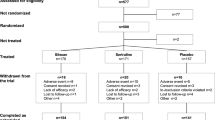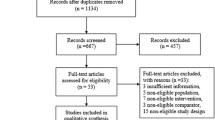Abstract
Purpose
Depressive symptoms are commonly experienced by cancer patients, especially those with advanced disease. The link between depression and survival outcome in cancer patients has received increasing attention. The purpose of this study was to determine, after adjusting the known covariates, whether the depressive symptoms during the first cycle of chemotherapy can predict the mortality of patients with advanced non-small cell lung cancer (NSCLC).
Methods
Patients with stage III or IV NSCLC were recruited from a large teaching hospital located in northern Taiwan. Depressive symptoms were assessed during the first cycle of chemotherapy using the Hospital Anxiety and Depression Scale-Depression subscale. A cut-off of 7/8 was used to categorize patients into depressed and non-depressed groups. All patients were followed up until the end of the study. The follow-up time ranged from 10 to 30 months.
Results
The study sample consisted of 90 NSCLC patients. Twenty patients (22.2%) were categorized as depressed. The median survival time in the depressed group was significantly shorter than that of the non-depressed group (11.83 vs. 24.47 months, P = 0.017). After controlling for demographic and clinical factors, depressive symptoms remained significantly (p = 0.023) associated with a shorter survival time. Compared to the non-depressed group, the depressed group had twice the risk of death (HR = 2.18, 95% CI = 1.11 to 4.28).
Conclusion
The finding supports that depressive symptoms at the early phase of treatment can predict shorter survival in patients with advanced NSCLC.

Similar content being viewed by others

References
(2009) Cancer Registration Annual Report 2006. Bureau of Health Promotion, Department of Health, The Executive Yuan, Taiwan, Taipei
Gotay CC, Kawamoto CT, Bottomley A, Efficace F (2008) The prognostic significance of patient-reported outcomes in cancer clinical trials. J Clin Oncol 26:1355–1363
Zabora J, BrintzenhofeSzoc K, Curbow B, Hooker C, Piantadosi S (2001) The prevalence of psychological distress by cancer site. Psychooncology 10:19–28
Hopwood P, Stephens RJ (2000) Depression in patients with lung cancer: prevalence and risk factors derived from quality-of-life data. J Clin Oncol 18:893–903
Spiegel D, Giese-Davis J (2003) Depression and cancer: mechanisms and disease progression. Biol Psychiatry 54:269–282
Satin JR, Linden W, Phillips MJ (2009) Depression as a predictor of disease progression and mortality in cancer patients: a meta-analysis. Cancer 115:5349–5361
Onitilo AA, Nietert PJ, Egede LE (2006) Effect of depression on all-cause mortality in adults with cancer and differential effects by cancer site. Gen Hosp Psychiatry 28:396–402
Buccheri G (1998) Depressive reactions to lung cancer are common and often followed by a poor outcome. Eur Respir J 11:173–178
Pirl WF, Temel JS, Billings A, Dahlin C, Jackson V, Prigerson HG, Greer J, Lynch TJ (2008) Depression after diagnosis of advanced non-small cell lung cancer and survival: a pilot study. Psychosomatics 49:218–224
Akechi T, Okamura H, Okuyama T, Furukawa TA, Nishiwaki Y, Uchitomi Y (2009) Psychosocial factors and survival after diagnosis of inoperable non-small cell lung cancer. Psychooncology 18:23–29
Faller H, Bulzebruck H, Drings P, Lang H (1999) Coping, distress, and survival among patients with lung cancer. Arch Gen Psychiatry 56:756–762
Faller H, Schmidt M (2004) Prognostic value of depressive coping and depression in survival of lung cancer patients. Psychooncology 13:359–363
Nakaya N, Saito-Nakaya K, Akechi T, Kuriyama S, Inagaki M, Kikuchi N, Nagai K, Tsugane S, Nishiwaki Y, Tsuji I, Uchitomi Y (2008) Negative psychological aspects and survival in lung cancer patients. Psychooncology 17:466–473
Nakaya N, Saito-Nakaya K, Akizuki N, Yoshikawa E, Kobayakawa M, Fujimori M, Nagai K, Nishiwaki Y, Fukudo S, Tsubono Y, Uchitomi Y (2006) Depression and survival in patients with non-small cell lung cancer after curative resection: a preliminary study. Cancer Sci 97:199–205
Peck A (1972) Emotional reactions to having cancer. CA Cancer J Clin 22:284–291
Folstein MF, Folstein SE, McHugh PR (1975) “Mini-mental state”. A practical method for grading the cognitive state of patients for the clinician. J Psychiatr Res 12:189–198
Zigmond AS, Snaith RP (1983) The hospital anxiety and depression scale. Acta Psychiatr Scand 67:361–370
Herrmann C (1997) International experiences with the Hospital Anxiety and Depression Scale—a review of validation data and clinical results. J Psychosom Res 42:17–41
Chen ML, Chang HK, Yeh CH (2000) Anxiety and depression in Taiwanese cancer patients with and without pain. J Adv Nurs 32:944–951
Chen ML, Tseng HC (2006) Symptom clusters in cancer patients. Support Care Cancer 14:825–830
Lien CY, Lin HR, Kuo IT, Chen ML (2009) Perceived uncertainty, social support and psychological adjustment in older patients with cancer being treated with surgery. J Clin Nurs 18:2311–2319
Karnofsky DA, Burchenal JH (1949) The clinical evaluation of chemotherapeutic agents. In: MacLeod CM (ed) Evaluation of chemotherapeutic agents. Columbia University Press, New York, pp 191–205
Stommel M, Given BA, Given CW (2002) Depression and functional status as predictors of death among cancer patients. Cancer 94:2719–2727
Hjerl K, Andersen EW, Keiding N, Mouridsen HT, Mortensen PB, Jorgensen T (2003) Depression as a prognostic factor for breast cancer mortality. Psychosomatics 44:24–30
Eton DT, Fairclough DL, Cella D, Yount SE, Bonomi P, Johnson DH (2003) Early change in patient-reported health during lung cancer chemotherapy predicts clinical outcomes beyond those predicted by baseline report: results from Eastern Cooperative Oncology Group Study 5592. J Clin Oncol 21:1536–1543
Wang XS, Shi Q, Lu C, Basch EM, Johnson VE, Mendoza TR, Mobley GM, Cleeland CS (2010) Prognostic value of symptom burden for overall survival in patients receiving chemotherapy for advanced nonsmall cell lung cancer. Cancer 116:137–145
Motulsky H (1995) Intuitive biostatistics. Oxford University Press, New York
Peduzzi P, Concato J, Feinstein AR, Holford TR (1995) Importance of events per independent variable in proportional hazards regression analysis II: accuracy and precision of regression estimates. J Clin Epidemiol 48:1503–1510
Castelli L, Binaschi L, Caldera P, Torta R (2009) Depression in lung cancer patients: is the HADS an effective screening tool? Support Care Cancer 17:1129–1132
Walker MS, Zona DM, Fisher EB (2006) Depressive symptoms after lung cancer surgery: their relation to coping style and social support. Psychooncology 15:684–693
Acknowledgement
This study was supported by research grants to Dr. Mei-Ling Chen from the National Science Council, Taiwan (grant numbers: NSC 94-2314-B-182-055, NSC 95-2314-B-182-012, and NSC 96-2314-B-182-006).
Conflict of interest
There is no relevant conflict of interest in this manuscript. We have full control of all primary data which can be reviewed by the journal if required.
Author information
Authors and Affiliations
Corresponding author
Rights and permissions
About this article
Cite this article
Chen, ML., Chen, MC. & Yu, CT. Depressive symptoms during the first chemotherapy cycle predict mortality in patients with advanced non-small cell lung cancer. Support Care Cancer 19, 1705–1711 (2011). https://doi.org/10.1007/s00520-010-1005-8
Received:
Accepted:
Published:
Issue Date:
DOI: https://doi.org/10.1007/s00520-010-1005-8



